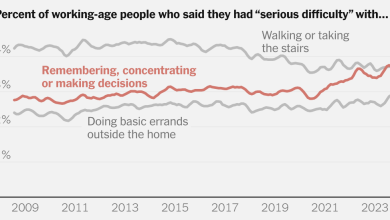Johnson’s Softer Tone on Northern Ireland Trade Rules Belies Hard-Line Plans

LONDON — Prime Minister Boris Johnson called for a return to politics-as-usual in Northern Ireland on Monday, even as his government was poised to outline legislation that could allow it to scrap parts of the trading system that has governed the North since Britain left the European Union.
The gap between Mr. Johnson’s comforting words and his government’s potentially disruptive actions illustrates the strange political dynamics of Northern Ireland, which remains a lingering source of tension more than two years after Brexit.
On a rare visit to Northern Ireland, Mr. Johnson urged its political parties to re-enter the territory’s power-sharing government after legislative elections earlier this month, in which the main Irish nationalist party, Sinn Fein, emerged as the largest party for the first time in the 101-year history of Northern Ireland.
The Democratic Unionist Party, which favors keeping Northern Ireland part of the United Kingdom and finished as runner-up to Sinn Fein, has refused to return to the government unless the legal construct that regulates trade in the territory under Brexit, known as the Northern Ireland protocol, is completely overhauled.
Mr. Johnson has promised to renegotiate the protocol with the European Union, and the new law the British government is to announce on Tuesday could allow it to scrap parts of it unilaterally if those talks fail.
But in a column published on Monday in The Belfast Telegraph, Mr. Johnson seemed to signal a more conciliatory course with Brussels. “Those who want to scrap the protocol, rather than seeking changes, are focusing on the wrong thing,” he wrote.
The arrangement, Mr. Johnson said, was a necessary condition of Northern Ireland’s hybrid status as a member of the United Kingdom that shares a border with a member of the European Union, the Irish Republic. He said he had negotiated it in “good faith” with Brussels, a claim that some in the E.U. might view with a jaundiced eye, given Britain’s desire to rewrite a deal it took years to hammer out.
Unionists complain that the protocol, which requires border checks on goods passing from mainland Britain to Northern Ireland, has driven a wedge between the North and the rest of the United Kingdom.
Experts on Northern Ireland said there was probably scope for the two sides to work out compromises on matters like border checks. The trouble is, the dispute is as much about issues of identity as it is about the mechanics of trade.
“Business, by and large, does not want this to go,” said Julian Smith, who served as Britain’s Northern Ireland secretary from 2019 to 2020 and is credited with breaking a previous deadlock between the parties.
A prolonged standoff, he said, could bring more political tensions to the fore and put a deal out of reach. “The longer it goes on, the more red lines there are, the more positions that might be unachievable are put forward,” Mr. Smith said.
The politics are not just within Northern Ireland. Hard-line Brexiteers in Mr. Johnson’s Conservative Party also dislike the protocol and are pressing the prime minister to demand changes from the European Union.
Mr. Johnson, whose standing in the party has been weakened by a scandal over illicit parties in Downing Street, is eager to mollify his right flank, and a fight with Brussels over Northern Ireland would be one way to do it.
“This government is largely performative,” said Jonathan Powell, a former chief of staff to Tony Blair, the prime minister at the time of the Good Friday Agreement, the 1998 pact that ended decades of sectarian violence inNorthern Ireland. Mr. Powell noted that Liz Truss, the foreign secretary who is pushing the legislation, is a prime candidate to replace Mr. Johnson if he is forced out.
The prime minister faces opposing pressure from the Biden administration, which has warned him not to take any steps that could jeopardize the Good Friday Agreement. Downing Street denied suggestions that Mr. Johnson’s more diplomatic tone in The Belfast Telegraph was a result of White House warnings.
Ms. Truss’s legislation, if passed, would provide an alternative to invoking Article 16 of the Brexit agreement, which gives either side the right to suspend parts of it under certain conditions. It would likely create a series of deadlines that could be used to exert pressure on the European Union to offer up concessions.
E.U. leaders are expected to respond coolly to Ms. Truss, and diplomats say they do not want to aggravate a tense situation. But after years of haggling over Brexit, they are no mood to rip up an agreement negotiated by Mr. Johnson, who described it as “oven ready” during the 2019 election when he promised to “get Brexit done.”
Europeans offered some significant changes last year and they see a pattern of Britain pocketing concessions only to return to demand more.
“It seems as if the British approach to the protocol is being very much led from the hard-line sidelines,” said Katy Hayward, a professor of political sociology at Queen’s University, Belfast. “This is why the E.U would be concerned that any more concessions would only be like feeding a crocodile.”
Some diplomats also suspect that Britain will try to divide the 27-nation bloc, perhaps by leveraging the good will it has gained through military support to European Union members that feel threatened by an aggressive Russia.
With Britain confronting a land war in Ukraine and supply-chain shocks that have driven up prices for food and fuel, this seems an inauspicious moment to trigger a trade war with the much-larger European Union.
If Ms. Truss’s plan looks unlikely to satisfy the European Union, analysts are also skeptical it will persuade the Democratic Unionists to allow a resumption of power sharing in Belfast. For now, Democratic Unionists seem to be digging in their heels, reflecting a fear that the party could be outflanked by a smaller and more hard-line unionist party, the Traditional Unionist Voice.
“We’ve heard the words, now we need to see the action,” said Jeffrey Donaldson, the leader of the Democratic Unionists, before meeting with Mr. Johnson.
Mr. Powell, who worked extensively on Northern Ireland diplomacy, said he worried that the political paralysis could flare into violence, especially with the traditional Protestant marching season looming in July. Last year, protesters hurled stones and gasoline bombs at police officers to protest what they called the “Brexit betrayal.”
Still, there was little sign of urgency from the unionists. They “feel that have the attention of the U.K. and the E.U. and they want to get as much as they can from this moment, bearing in mind that it might be gone fairly quickly,” Professor Hayward said.





